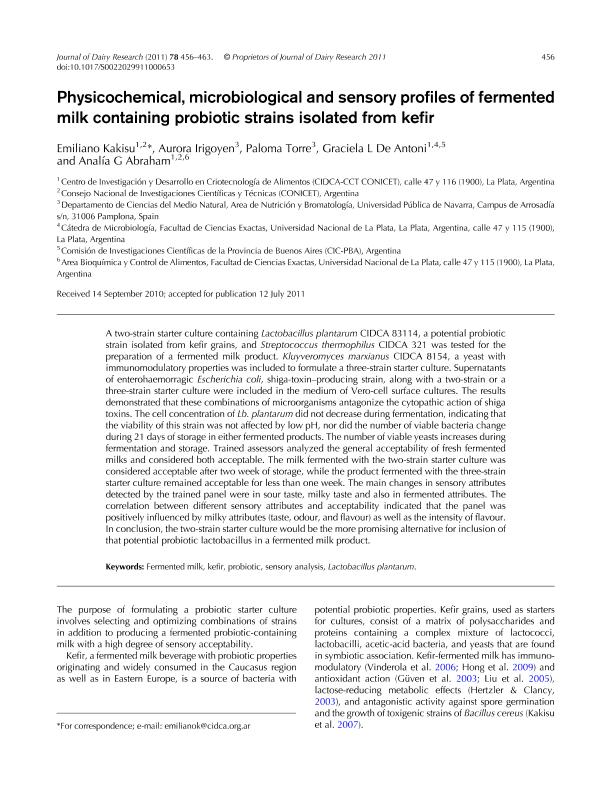Mostrar el registro sencillo del ítem
dc.contributor.author
Kakisu, Emiliano Javier

dc.contributor.author
Irigoyen, Aurora
dc.contributor.author
Torre, Paloma
dc.contributor.author
de Antoni, Graciela Liliana

dc.contributor.author
Abraham, Analia Graciela

dc.date.available
2020-07-20T20:44:45Z
dc.date.issued
2011-11
dc.identifier.citation
Kakisu, Emiliano Javier; Irigoyen, Aurora; Torre, Paloma; de Antoni, Graciela Liliana; Abraham, Analia Graciela; Physicochemical, microbiological and sensory profiles of fermented milk containing probiotic strains isolated from kefir; Cambridge University Press; Journal of Dairy Research; 78; 4; 11-2011; 456-463
dc.identifier.issn
0022-0299
dc.identifier.uri
http://hdl.handle.net/11336/109707
dc.description.abstract
A two-strain starter culture containing Lactobacillus plantarum CIDCA 83114, a potential probiotic strain isolated from kefir grains, and Streptococcus thermophilus CIDCA 321 was tested for the preparation of a fermented milk product. Kluyveromyces marxianus CIDCA 8154, a yeast with immunomodulatory properties was included to formulate a three-strain starter culture. Supernatants of enterohaemorragic Escherichia coli, shiga-toxin–producing strain, along with a two-strain or a three-strain starter culture were included in the medium of Vero-cell surface cultures. The results demonstrated that these combinations of microorganisms antagonize the cytopathic action of shiga toxins. The cell concentration of Lb. plantarum did not decrease during fermentation, indicating that the viability of this strain was not affected by low pH, nor did the number of viable bacteria change during 21 days of storage in either fermented products. The number of viable yeasts increases during fermentation and storage. Trained assessors analyzed the general acceptability of fresh fermented milks and considered both acceptable. The milk fermented with the two-strain starter culture was considered acceptable after two week of storage, while the product fermented with the three-strain starter culture remained acceptable for less than one week. The main changes in sensory attributes detected by the trained panel were in sour taste, milky taste and also in fermented attributes. The correlation between different sensory attributes and acceptability indicated that the panel was positively influenced by milky attributes (taste, odour, and flavour) as well as the intensity of flavour. In conclusion, the two-strain starter culture would be the more promising alternative for inclusion of that potential probiotic lactobacillus in a fermented milk product.
dc.format
application/pdf
dc.language.iso
eng
dc.publisher
Cambridge University Press

dc.rights
info:eu-repo/semantics/openAccess
dc.rights.uri
https://creativecommons.org/licenses/by-nc-sa/2.5/ar/
dc.subject
SENSORY ANALYSIS
dc.subject
FERMENTED MILK
dc.subject
KEFIR
dc.subject
LB. PLANTARUM
dc.subject.classification
Alimentos y Bebidas

dc.subject.classification
Otras Ingenierías y Tecnologías

dc.subject.classification
INGENIERÍAS Y TECNOLOGÍAS

dc.title
Physicochemical, microbiological and sensory profiles of fermented milk containing probiotic strains isolated from kefir
dc.type
info:eu-repo/semantics/article
dc.type
info:ar-repo/semantics/artículo
dc.type
info:eu-repo/semantics/publishedVersion
dc.date.updated
2020-06-23T13:24:15Z
dc.journal.volume
78
dc.journal.number
4
dc.journal.pagination
456-463
dc.journal.pais
Reino Unido

dc.journal.ciudad
Cambridge
dc.description.fil
Fil: Kakisu, Emiliano Javier. Provincia de Buenos Aires. Gobernación. Comisión de Investigaciones Científicas. Centro de Investigación y Desarrollo en Criotecnología de Alimentos. Consejo Nacional de Investigaciones Científicas y Técnicas. Centro Científico Tecnológico Conicet - La Plata. Centro de Investigación y Desarrollo en Criotecnología de Alimentos. Universidad Nacional de La Plata. Facultad de Ciencias Exactas. Centro de Investigación y Desarrollo en Criotecnología de Alimentos; Argentina
dc.description.fil
Fil: Irigoyen, Aurora. Universidad Pública de Navarra; España
dc.description.fil
Fil: Torre, Paloma. Universidad Pública de Navarra; España
dc.description.fil
Fil: de Antoni, Graciela Liliana. Provincia de Buenos Aires. Gobernación. Comisión de Investigaciones Científicas. Centro de Investigación y Desarrollo en Criotecnología de Alimentos. Consejo Nacional de Investigaciones Científicas y Técnicas. Centro Científico Tecnológico Conicet - La Plata. Centro de Investigación y Desarrollo en Criotecnología de Alimentos. Universidad Nacional de La Plata. Facultad de Ciencias Exactas. Centro de Investigación y Desarrollo en Criotecnología de Alimentos; Argentina
dc.description.fil
Fil: Abraham, Analia Graciela. Provincia de Buenos Aires. Gobernación. Comisión de Investigaciones Científicas. Centro de Investigación y Desarrollo en Criotecnología de Alimentos. Consejo Nacional de Investigaciones Científicas y Técnicas. Centro Científico Tecnológico Conicet - La Plata. Centro de Investigación y Desarrollo en Criotecnología de Alimentos. Universidad Nacional de La Plata. Facultad de Ciencias Exactas. Centro de Investigación y Desarrollo en Criotecnología de Alimentos; Argentina
dc.journal.title
Journal of Dairy Research

dc.relation.alternativeid
info:eu-repo/semantics/altIdentifier/doi/http://dx.doi.org/10.1017/S0022029911000653
dc.relation.alternativeid
info:eu-repo/semantics/altIdentifier/url/https://www.cambridge.org/core/journals/journal-of-dairy-research/article/physicochemical-microbiological-and-sensory-profiles-of-fermented-milk-containing-probiotic-strains-isolated-from-kefir/E3313392FA6DA22D21A81BE25FD8CA9D
Archivos asociados
